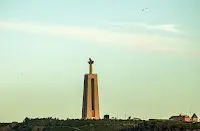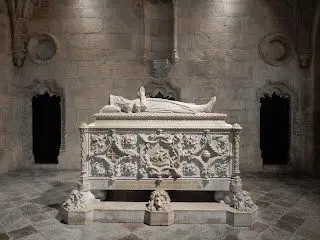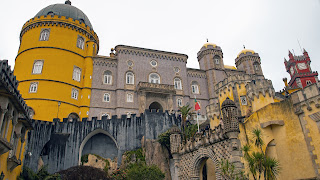Lisbon is the vibrant capital of Portugal, a gorgeous city steeped in history, impressive architecture, cultural diversity, and friendly residents.
The only things that could spoil a visit would be the weather, sitting in an enclosed tour bus, and not having enough time to take in a lot of the activities and sights to satisfy the curious tourist. Unlucky me and my fellow travelers.
We encountered off-and-on rain during our two days in Lisbon, a city spread over seven hills and facing the Atlantic Ocean to the west. Of course, the weather is something you have no control over when on a guided tour. You take what you get from Mother Nature and deal with it. And you take along an umbrella or rain jacket just in case.
Along the way to our hotel, we drove past many places that I’d seen on YouTube travelogues, Rick Steves’s videos about Lisbon, and the three books about Portugal that I had perused in the months before departing from my old Kentucky.
I learned about an earthquake in 1755 that devastated the city and much of Portugal, as well as parts of Morocco and Spain. Up to 50,000 people died and 85 percent of Lisbon’s buildings crumbled to the ground in one of the worst earthquakes in history. It’s often referred to as the Great Lisbon earthquake.
But you’re not here for a history lesson.
 |
| Cristo Rei monument |
First, a few sights I saw from the bus: the historic Santa Justa Lift, Rossio Square, and Cristo Rei statue. We also passed by some garden areas and parks that looked interesting. I had hoped to find some free time to do some urban hiking. But I didn’t.
By the way, I seldom take photos from a bus because I don’t like to see the reflection of the interior from the windows.
What we saw was part of my Bucket List, so all was not lost. I just wished I could have seen more of what the city offered to visitors.
We visited the impressive Jerónimos Monastery, a UNESCO World Heritage Site which contains the tomb of Portuguese explorer Vasco da Gama and a few other notable citizens.
 |
| Vasco da Gama sarcophagus |
From there we went to the massive Monument of the Discoveries, remembering seafaring explorers such as Henry the Navigator, Vasco da Gama, Pedro Alvares Cabral, and other luminaries from the 15th and 16th centuries.
 |
| Monument of the Discoveries |
We made a brief stop at the Belém Tower, a 16th-century fortification on the northern bank of the Tagus River. It also served as a departure-and-arrival place for the fearless explorers of the world.
 |
| Belém Tower |
The principal attraction of the Lisbon stop was the colorful Pena Palace, another UNESCO World Heritage Site located atop a hill in the Sintra Mountains. It began in the Middle Ages as a small monastery, but like many places in 1755, the Lisbon Earthquake destroyed it.
 |
| Pena Palace |
King Ferdinand II built a summer residence for the royal family at the site, with construction between 1842-54. The castle has an eclectic feel with its colors and styles—because the king wanted it that way. I should mention that it rained during our visit. After touring the palace, we spent part of the afternoon in charming Sintra. I also learned that the pop singer Madonna once lived near the palace.
I’d like to return to Portugal, but only after I check off other places on my to-do travels. As the old saying notes, “you only go around once and then you ___” (you fill in the blank).
There are an estimated half-million expats living in Portugal, including about 50,000 Americans. That speaks well of the desirability and quality of life in the nation that it would attract others. I know I found it appealing.
I hope you’ve enjoyed my posts about Portugal. Feel free to “Follow” me on my journeys by clicking the button in the right column.
Until the next time . . .
Notifications